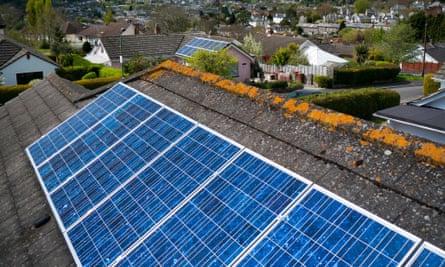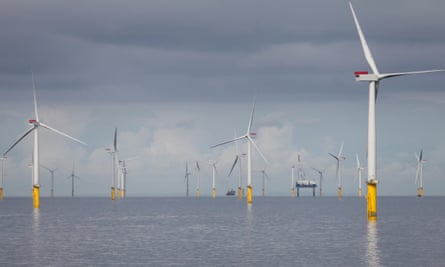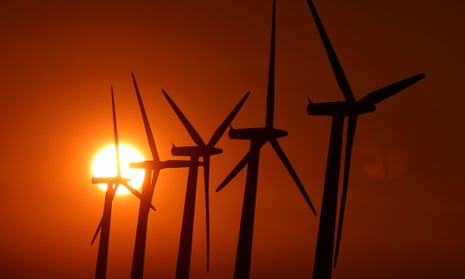The Conservatives will end subsidies to onshore windfarms from 1 April 2016, a year earlier than set out in the previous Tory-Liberal Democrat coalition agreement.
There will be a grace period for projects that already have planning permission, the Department of Energy and Climate Change said.
Labour claimed the announcement jeopardises 1,000 wind turbines that are awaiting planning permission and cannot make a profit without a government subsidy.
The onshore wind industry attacked the move as a costly political intervention, while trade body RenewableUK called for an urgent meeting with the new energy secretary, Amber Rudd, to discuss the implications of the announcement.
Rudd and the communities secretary, Greg Clark, are also to press ahead with plans to give local communities – rather than national government – the right to veto windfarms.
There will also be two new “planning tests” so that councils can only approve windfarms on sites that have been clearly designated as part of a local or neighbourhood plan, and where the proposed project has the backing of the local community.

The funding for the subsidies comes from the “renewable obligation”, which is funded by levies added to household fuel bills.
Rudd said her announcement should not come as a surprise to the industry since David Cameron had said the subsidies would be ending early and the change had been clearly signalled.
She told the BBC Radio 4 Today programme: “This cannot come as a surprise to the industry. It was alerted by previous Conservative energy ministers and by the prime minister.”
She said she was engaged in discussion with the Scottish government, which has warned it may seek a judicial review of the decision.
And Rudd insisted the change to the timetable would not mean the government could not meet its targets for renewable energy by 2020, saying there were enough decisions in the pipeline to ensure such targets were met.
But the European commission warned on Tuesday that the UK was set to miss its key EU renewable energy target for 2020, and told the government it should review its policies to get back on track.
The Scottish government’s energy minister, Fergus Ewing, has said it is irrational to reduce or scrap onshore wind subsidies. He claimed, citing figures from Scottish Power, that British consumers could end up paying between £2bn and £3bn more in bills. Scotland would be home to 70% of planned future windfarms and the Edinburgh government claims it has not been consulted by the UK government.
Downing Street dismissed the commission’s warning and denied claims that scrapping subsidies could cause bills to rise. “The priority is making sure we keep bills down for consumers and families and making sure communities have more of a say over what happens in their area,” Cameron’s official spokesman said.
Meanwhile, Rudd rejected protests from the industry that she was intervening just when it was on the way to maturity. She said solar was just as cost-effective and had nearly reached grid parity.
She said: “We have to create a balance between supporting the industry, reaching our targets and looking after the taxpayer.” By 2020 she said windfarms would provide 10% of the energy the UK needed.
She also confirmed she was content for the Chinese government to invest in new nuclear plants in the UK, despite its questionable nuclear safety record. She said Chinese investors would be subject to UK nuclear safety regulation standards.
Caroline Flint, the shadow energy secretary, said renewable energy investment was undermined by the mixed messages of Cameron’s last government, and “sadly that looks set to continue”.
“Onshore wind is the cheapest and most developed form of clean energy and there are 1,000 projects whose investment plans could be affected by the latest moving of the goalposts. Ministers need to make clear which projects exactly the grace period will apply to,” Flint said.
In an attempt to show that Cameron was not abandoning the green agenda, the Tory 2015 manifesto also agreed to press ahead with an intensification of offshore windfarms.

Energy is a UK government responsibility, but Ewing earlier this month wrote to Rudd, saying: “It is disappointing that I have not had the opportunity to engage with you on this ahead of it being a matter for speculation in the press.
“We have not received any information from your department on the possible options you are considering or what analysis has been done to assess the impact on projects in Scotland.”
Ewing warned that changing previously agreed subsidies would cause a crisis of confidence with business.
His letter said: “Any lack of clarity on the UK government’s intentions has the potential to stall a very substantial pipeline of investment in the UK and Scotland and dent [our] reputation with developers and inward investors.”
Environmentalists and the wind power industry accused the government of attacking the cheapest form of renewable energy, and said the move would send a “chilling signal” to investors.
Maria McCaffery, chief executive of RenewableUK, said: “The government’s decision to end prematurely financial support for onshore wind sends a chilling signal not just to the renewable energy industry, but to all investors right across the UK’s infrastructure sectors.
“It means this government is quite prepared to pull the rug from under the feet of investors even when this country desperately needs to clean up the way we generate electricity at the lowest possible cost – which is onshore wind. People’s fuel bills will increase directly as a result of this government’s actions.”
RenewableUK also said senior economists in the sector had calculated
that billpayers could end up paying £3bn more because of
commitments to meet binding targets.
Doug Parr, chief scientist at Greenpeace UK, said pulling “support for [the] cheapest low-carbon power” was a fail by the government.
Ed Davey, the Lib Dem former energy and climate change secretary, said: “Anti-wind power Tories will put up electricity bills, cut green jobs and reduce investment.”
The announcement comes on the same day as the pope is to deliver his encyclical on the environment, which, environmentalists hope, will add momentum for a strong climate deal at a crunch UN summit in Paris this December.
The Green party’s leader, Natalie Bennett, said: “The government’s plans to end subsidies for onshore wind farms are short-sighted and irrational.”
Emma Pinchbeck, head of climate and energy policy at WWF UK, said: “The proposed cuts to onshore wind will drive out investment in the cheapest form of renewable electricity and put up energy bills.”
She added: “The prime minister is showing leadership on securing a global agreement on climate change [in Paris]. The government needs to close the gap between this international commitment and their domestic policy decisions if it is not to undermine his credibility on the international stage.”

Comments (…)
Sign in or create your Guardian account to join the discussion